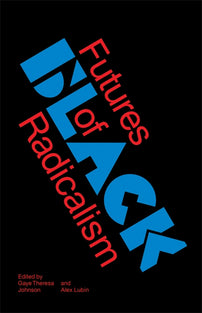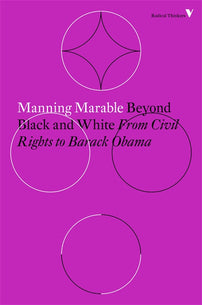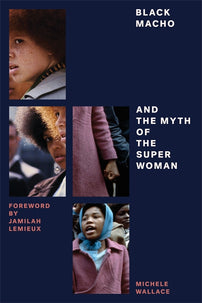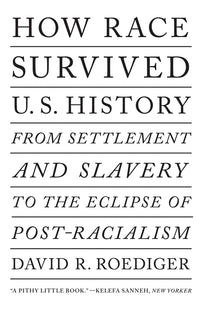Black and Red: Socialism and Black Liberation with Robin Kelley and Charisse Burden-Stelly
An interview with Robin Kelley and Charisse Burden-Stelly on Black liberation and socialism.

Conversations in Black Freedom Studies (CBFS) is a monthly discussion series held at the Schomburg Center for Research in Black Culture. Curated by Jeanne Theoharis and Komozi Woodard, the series was established as a space to discuss the latest scholarship in Black freedom studies, bringing the campus and community together as scholars and activists challenge the older geography, leadership, ideology, culture, and chronology of Civil Rights historiography. In anticipation of the discussion on Black Liberation and Socialism, scheduled for April 1st, we are highlighting the scholarship of two of their guests, Robin Kelley and Charisse Burden-Stelly.
Robin Kelley is the Gary B. Nash Endowed Chair in US History at UCLA. His research has explored the history of social movements in the US, the African Diaspora, and Africa; black intellectuals; music and visual culture; Surrealism, Marxism, among other things. His books include, Freedom Dreams: The Black Radical Imagination and Hammer and Hoe: Alabama Communists During the Great Depression, among many others. Kelley’s forthcoming Black Bodies Swinging: An American Postmortem is a genealogy of the Black Spring protests of 2020 by way of a deep examination of state-sanctioned racialized violence and a history of resistance.
Charisse Burden-Stelly is Assistant Professor of Africana Studies and Political Science at Carleton College. Her scholarship traverses Africana Studies, Critical Theory, Political Theory, and Political Economy with a substantive focus on anti-radicalism, anti-blackness, and state-sanctioned violence; globalization and economic development; and epistemologies of Black Studies. She is coauthor, with Gerald Horne, of W.E.B. Du Bois: A Life in American History, and numerous articles on capitalism, racial capitalism, anti-capitalism, and socialism. She is the co-author of the upcoming Verso book Organize, Fight, Win: Three Decades of Black Communist Women’s Political Writing.
Erik Wallenberg is a PhD Candidate in History at CUNY Graduate Center. He studies the radical art and theater produced out of environmental crises, in opposition to war, and by the Black freedom struggle and other social movements. He is outreach coordinator for Conversations in Black Freedom Studies.
Erik Wallenberg for CBFS: You both study and write about Black liberation and socialism. Can you start by telling us how you came to do this work?
Robin Kelley: I suppose I should blame my mother, who raised my sister and me in Harlem and took us to various demonstrations (from protests against school overcrowding to anti-war marches) and my sister Makani Themba, who not only taught me to read but introduced me to Black nationalism and Marxism when I was in high school. There were others along the way, of course, but when I entered college at Long Beach State University in 1980, I jumped immediately into Black Studies and campus political work, serving as vice-chair of the Black Student Union at some point and participating in a study group organized by the All-African People’s Revolutionary Party. We read Nkrumah and Fanon and Walter Rodney, and I joined other study groups where we read Marx, Lenin, Mao, Rosa Luxemburg, among many others. Of course, this was the early 1980s when anyone who was on the Left in those days was active in resisting the U.S. invasion and occupation of Grenada and Panama, apartheid in South Africa, death squads in Central America, police brutality, anti-black and anti-Asian violence, and a second-term for Ronald Reagan. By 1983, I started graduate school in African history at UCLA, and my sister recruited me into the Communist Workers Party—an outgrowth of Workers Viewpoint Organization with strong roots in the Asian-American and Black Liberation movements. We were as concerned about the racist murder of Vincent Chin as we were with the murders of Michael Stewart and Eleanor Bumpurs.
So as a young Communist dedicated to Black Liberation, I studied Marxist movements in Africa, focusing specifically on the Left in South Africa and the U.S. South. Feeling a bit defeated, I wanted to understand the persistent failure of socialist and Communist movements to mobilize black working people. And then I encountered Cedric Robinson’s extraordinary book, Black Marxism: The Making of the Black Radical Tradition, and realized I was asking the wrong question: It was never about a failing in the “Left’s” ability to mobilize Black people but our conceptual failure to recognize a Black radical tradition critical of, and illegible to, a Euro-American Left formed by the logic of Western Civilization. When this tradition found its way into Left movements—in Africa, Latin America, even the US—it brought a unique vision, historical sensibility and set of resistance strategies to the Communist movement—and in doing so, altered the Party. In other words, whereas most scholars set out to prove just how alien Communism was to black people, Robinson compelled me to ask what Black people brought to the Left to make it their own? The presumed objects of Communist machinations became subjects and agents in making their own history.
Charisse Burden-Stelly: Three things come to mind for me. The first is a course I took as an undergraduate at Arizona State University titled “The Making of Modern Africa” taught by Dr. Lisa Aubrey. In that course I first encountered the writings of scholars like Claude Ake and Walter Rodney and began to understand the relationship between development, underdevelopment, and racialized narratives that rationalized inequality, exploitation, and oppression. The second event was selecting my dissertation topic with my advisor Dr. Percy C. Hintzen, a radical Guyanese political sociologist, which helped me to understand the relationship between antiblack racism, antiradical disciplining in the US academy and in US society, and the threat that anticapitalism has posed historically to capitalist exploitation rooted in racial hierarchy. Finally, Gerald Horne’s Black Liberation/Red Scare: Ben Davis and the Communist Party illuminated the connections between Black liberation and socialism in a fundamental way.
Erik: Can you share the story of a particular figure or event from your work that our readers might not be familiar with, that helps us see these struggles together?
Robin: This is a difficult question since I write more about movements than individual people—though this is what movements are made of. Virtually everyone I write about, at least in my non-music scholarship, operates as if Black liberation and socialism were/are inseparable. I want to hold up the late Guyanese revolutionary Andaiye and her book, The Point is to Change the World, edited by Alissa Trotz and for which I wrote a foreword. Andaiye was a founding member of Guyana’s Working People’s Alliance, along with Walter Rodney, Eusi Kwayana, Rupert Roopnaraine, and others. She edited their journal Dayclean and advanced a Marxist analysis that centered reproductive labor and the problem of gendered violence. In my opinion, Andaiye was one of the most incisive and imaginative radical thinkers in the hemisphere. By redirecting the focus from the “point of production” to reproduction, she became a leading proponent of the international “Wages for Housework” movement. She framed the demand for wages for housework through a global anti-imperialist lens, pointing to the deterioration of working-class households in the face of Third World debt, unemployment, male migration, and growing precarity caused by neoliberal policies, austerity measures, and structural adjustment policies. Furthermore, the crisis generated by neoliberalism provoked an increase in state, domestic, interpersonal, community and gendered violence, as well as racial tensions and xenophobia not just in Guyana but throughout the Caribbean. Taken together, Andaiye observed, all of these factors have not only deepened gender inequality but accelerated the exploitation of women, who are now burdened with providing more for their families as social services and subsidies are slashed, men are forced to migrate for work, and women have even less time to organize against these conditions. As a principal leader of Global Women’s Strike, she believed that women can—and must—be organized. She took the Left to task for underestimating the power of “housewives” to mobilize and lead militant campaigns. She explicitly cites the example of the 1983 food rebellion in Guyana, a struggle led by housewives in alliance with trade unionists in the Sugar and Bauxite Workers Unity Committee. For Andaiye, the lesson was clear: “There is no frontier between home and street.”
Charisse: For me, an event that signaled the importance of Black liberation and socialist transformation to combatting the entanglement of antiblackness and antiradicalism was the Peekskill Riot. This terrible event took place on August 27, 1949, at a scheduled Harlem Chapter Civil Rights Congress concert in Peekskill, New York, where the world-renowned Black radical, Paul Robeson, had showed up to sing. As soon as he arrived, white veterans started a parade in opposition to the concert and barricaded the roads leading up to the concert grounds. A vicious mob assaulted those who had gathered at the event—men, women, and children—and yelled antiblack and antisemitic insults. They also burned a five-foot cross on the concert grounds. In defiance, 25,000 Robeson supporters again gathered on September 4, 1949 to hear him sing; attendees were again attacked when leaving the concert—their cars and buses were pelted with rocks and clubs, windows were smashed, and some cars were overturned. Over 200 people were injured. Over 900 police officers on the scene sided with, aided, and encouraged the attack. Instead of defending the civil rights of the largely left-wing crowd that had been savagely attacked, on September 14, ten days after the second riot, Governor Thomas Dewey deceitfully blamed the violence and lawlessness on the victims by construing the concert as a “communist plot.”
Officers of the Council on African Affairs—an important radical anticolonial organization—including Robeson, W.E.B. Du Bois, William Alphaeus Hunton, Jr., and Louise Thompson Patterson, submitted a letter to President Harry Truman on October 12, 1949. They charged that Governor Dewey and his lackeys had failed to protect the lives, rights, and property of American citizens—thus, he was unfit to hold office. They demanded an investigation by the Attorney General and the Civil Rights Department into the Peekskill riot and prosecution of those responsible. They also linked the riot to earlier attacks on Robeson and on other Black leaders and to cases of police brutality for which no one was held accountable.
The letter stated, “Peekskill demonstrated what this mounting anti-Negro violence and contempt for human rights may develop into unless speedily checked. Peekskill was a reminder of Hitlerite Germany where fascism got its start with organized mob assaults, with official sanction, against the Jewish people in the name of German ‘patriotism’ and ‘anticommunism.’” The letter was signed by a host of radical Blacks, including: Charlotta Bass, Thelma Dale, Earl B. Dickerson, Ollie Harrington, and William L. Patterson.
Erik: Considering the current movement for Black lives and the perpetual economic crisis we are living through, how does an understanding of race and class together help us understand and even act in our current world?
Robin: Simply put, I can’t conceive of any analysis that doesn’t treat race and class together. The “perpetual economic crisis” to which the question refers is racial capitalism, which is to say that while capitalism is prone to periodic crises, for working-class Black, Brown, Indigenous people they experience perpetual crisis. Once we acknowledge the combined and uneven development of capitalism, then we have to acknowledge how race and gender unevenly structure the character of exploitation. Capitalism—always racial, as Ruth Wilson Gilmore says—extracts surplus value and structures exchange value by assigning differential value to human life and labor, historically and in the present. With regard to the present (or last four decades), we have endured a neoliberal variant of racial capitalism that involved dismantling the welfare state; promoting capital flight; privatizing public schools, hospitals, housing, transit, and other public resources; and the massive growth of police and prisons. These policies have produced scarcity, poverty, alternative (illegal) economies regulated through violence, and environmental and health hazards. And just to be clear, racial capitalism is not “race reductionism” nor is it the antidote to “class reductionism.” To insist that capitalism has always operated within a system, and ideology that assigns differential value to human life and labor, does not mean that race governs or explains all forms of exploitation and oppression.
One parting point with respect to how we “act” (or think) in our current world: while we continue to fight all manner of oppression and exploitation—state violence, devolution of the social wage, the carceral state, gendered violence and femicide, environmental catastrophe, and struggle for housing, living wage, and so on, I just wanted to underscore the fight for “socialism”—a word that has practically vanished from any discussion of Black liberation, sometimes replaced by “abolition” and oftentimes by nothing at all. To be anticapitalist is one thing, but what are we for?
Charisse: Using racial capitalism as an analytical framework helps us to see that race and class—or racialized oppression and capitalist exploitation—are mutually constitutive. More than that, it helps us to understand the interlinked perils of endless accumulation, racial hierarchy, perpetual war, imperialism, neocolonialism, expropriation, superexploitation, and ecological degradation, all of which threaten human and other-than-human existence by placing private property and profit over people.




